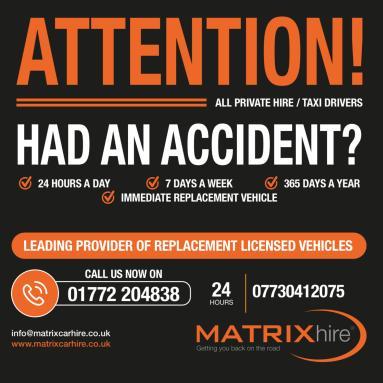






TaxiPoint Chief Editor:
Perry Richardson
TaxiPoint Publishing & Advertising Manager:
Lindsey Richardson
Visit us online at:
www.taxi-point.co.uk
Write to us at: contact@taxi-point.co.uk
Advertising enquiries at: advertising@taxi-point.co.uk









TaxiPoint Chief Editor:
Perry Richardson
TaxiPoint Publishing & Advertising Manager:
Lindsey Richardson
Visit us online at:
www.taxi-point.co.uk
Write to us at: contact@taxi-point.co.uk
Advertising enquiries at: advertising@taxi-point.co.uk

The publishers reserve the right to refuse, withdraw, amend or otherwise deal with all advertisements without explanation. All advertisers must comply with the British Code of Advertising practice.
The views expressed in this publication are not necessarily those of the publishers.
All written and image rights are reserved by the author as displayed. Reproduction in whole or in part without prior permission from the publisher is strictly prohibited.
Copyright brand TaxiPoint 2025. Creative Common image licences displayed where applicable.


Welcome to the April 2025 edition of TaxiPoint Magazine, issue 72.
Last month we warned it felt like the calm before the storm, and now that storm appears to have arrived.
Transport for London has released its latest Taxi and Private Hire Action Plan. Yet, according to many in the trade, there’s very little in it that resembles action. The document follows a warning from industry voices that without significant support, the iconic black cab could fade out over the next twenty years.
VAT in the private hire sector has also become a pressing issue. The volume around the debate has grown louder, with operators, drivers and legal experts weighing
in. This edition, we speak to Layla Barke-Jones to bring further clarity on what it could mean for the industry.
Meanwhile, on the international front, President Trump’s new trade tariffs throw up fresh questions. The full impact on the UK economy remains to be seen. Inflation, job cuts and reduced consumer spending are all on the table. Whether this affects the taxi sector directly or not, it’s something the industry will be watching closely.
The road ahead looks far from quiet.
Enjoy the read and be lucky,

Perry Richardson

he number of black cab drivers continues to fall, with recruitment failing to replace those leaving the industry. Despite a slight increase in Knowledge of London (KoL) applicants, the numbers remain well below what is needed to maintain driver levels, let alone grow them.
As of 2 February 2025, the number of licensed taxi drivers in London had dropped to 16,847

downward trend has been clear for some time and there’s now a feeling of real urgency to get something in place to stem the decline.
In response, Transport for London (TfL) has introduced a significant change to the Knowledge. From 10 February 2025, candidates will be tested on a set list of 6,000 locations, rather than being asked about any location within London. The hope is that this will speed up the process while maintaining the high standards required to become a licensed taxi driver.

The KoL remains one of the toughest taxi qualification tests in the world. Drivers must memorise major landmarks, transport hubs, hospitals, and key drop-off points across London. The revised list will be updated every three months, ensuring candidates focus on relevant
But will this change be enough to encourage more people to apply?
The adjustment may offer more structure, but it does not alter the fundamental challenge of the the perception of the job as taxi driver. Learning London’s streets in such detail still requires years of dedication, and fewer people understand just what the benefits are both financially and as a lifestyle. If someone

even slightly interested in driving a black taxi as a living is unaware of the earning potential, why would they take the risk when they could simply become a private hire driver in no time? If the goal is to increase driver numbers, more targeted measures are needed. Improved promotion of the profession and a clear plan detailing what the role of a taxi driver will look like over the next decade at least. Are local authorities going to keep taking away road space? Are taxis a key part of ground surface mobility on par with buses or will
they be treated more like private cars? If London wants a thriving taxi service it’s time to be proud of it and outwardly talk positively about it.
A more structured Knowledge test is a step in the right direction. But is it enough to reverse the decline in applicants? On its own, probably not.


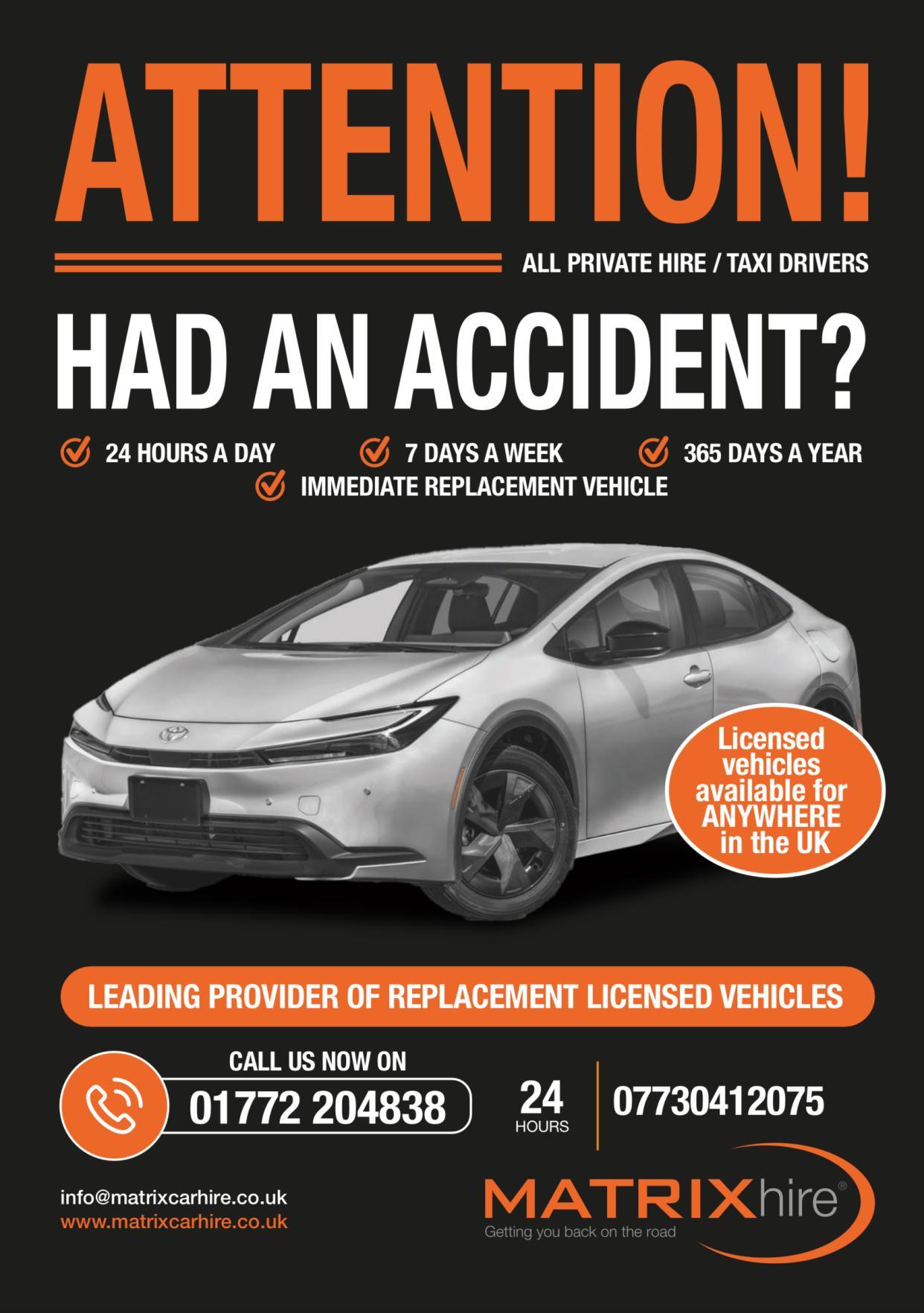


The Triple Lock rule has long been the foundation of private hire licensing in England and Wales, requiring that a private hire driver’s badge, vehicle plate, and operator’s licence must all be issued by the same licensing authority. However, widespread crossborder hiring has led to concerns about regulatory oversight and local enforcement. This is where Intended Use Policies (IUPs) have been discussed and could come into play.
An Intended Use Policy is designed to stop the deliberate licensing of private hire vehicles in one council area while predominantly working in another. Councils that implement an IUP would require licence applicants to declare where their vehicle will be primarily operated. If a vehicle is found to be predominantly working outside its licensing area, the council has the power to revoke its licence.
The Triple Lock Rule ensures that a driver, vehicle, and operator must all be licensed by the same authority, making any private hire booking legal.

However, this system does not prevent drivers and vehicles from operating in different licensing areas once legally licensed. An Intended Use Policy aims to reinforce local licensing control by ensuring that vehicles and drivers primarily operate in the area where they are licensed.
While the Triple Lock ensures regulatory consistency within an individual council, it does not prevent Predominant Out of Area Hiring, where vehicles licensed in one area deliberately work in another. IUPs could close this loophole by making it a condition of licensing that vehicles and operators must primarily work in their home council area.
Cross-border hiring the practice of private hire drivers working in areas outside their licensing authority has long been a feature of the industry. Traditionally, this allowed drivers to complete longdistance journeys legally, such as picking up a return fare from a distant drop-off point. However, in recent years, the system has been exploited by drivers and operators who obtain licences from councils with possibly lower standards or faster

licensing processes and then operate almost entirely elsewhere.
This has led to a loss of local licensing control, where councils struggle to regulate vehicles and drivers operating in their area but licensed elsewhere. Local enforcement officers have no jurisdiction over out-of-town private hire vehicles, leading to concerns about public safety, insurance compliance, and vehicle standards.
One of the biggest concerns surrounding crossborder hiring is its impact on enforcement and public safety. When a driver and vehicle are licensed by one council but work in another, enforcement officers in the area where they operate have no authority over them. This makes it difficult to ensure that vehicles are roadworthy and that
drivers meet the standards set by the local licensing authority.
Cases have emerged where vehicles licensed in one area have been found operating with serious defects elsewhere, beyond the reach of the licensing officers responsible for their regulation. This creates a two-tier licensing system, where local drivers adhere to stricter standards while out-oftown drivers operate with less oversight.
There are also ongoing and muddied insurance concerns. Some private hire insurance policies are based on the assumption that vehicles will primarily operate within their licensing area. If a driver fails to disclose that they are working predominantly in another council area with higher risk associated, questions have long been asked about what the impact could be on their hire and reward insurance.



The push for a nationally enforced Intended Use Policy has grown in response to the mass licensing of private hire vehicles by councils that issue licences with minimal scrutiny. Wolverhampton, for example, has issued tens of thousands of licences to drivers who do not live or operate in the city. This has led to complaints from neighbouring councils that their enforcement teams are powerless to regulate the influx of out-of-town vehicles.
Back in 2020 the GMB proposed a ‘Triple Intended Use Policy’ (Triple IUP) that would apply IUPs to private hire vehicles, hackney carriages, and private hire operators. This would have ensured that all three elements of the licensing system remain under local authority control, rather than allowing mass cross-border operations to continue unchecked.
An IUP would not prevent natural cross hiring, where a driver picks up a passenger in one area and drops them off in another before returning to their home area. Instead, it would target the deliberate and systematic practice of licensing vehicles in one area and deploying them predominantly in another.
council with the least regulation and work elsewhere.
The Triple Lock rule was meant to ensure that all private hire work is conducted under a single licensing authority’s control. However, it could be argued that without an Intended Use Policy, it has been exploited to enable widespread cross-border hiring, eroding local licensing control.
An Intended Use Policy could reinforce the Triple Lock by requiring that vehicles and operators primarily work within their licensing area, preventing the mass displacement of private hire services. With growing concerns over enforcement and public safety, there is a section within the

local authority, but they would need to work predominantly in that area. If they failed to do so, their vehicle licence could be revoked.
Many councils already apply an Intended Use Policy to hackney carriages, ensuring that taxis licensed in one area primarily operate there. Extending this principle to private hire vehicles would in theory level the playing field, ensuring that private hire drivers cannot simply obtain a licence from the
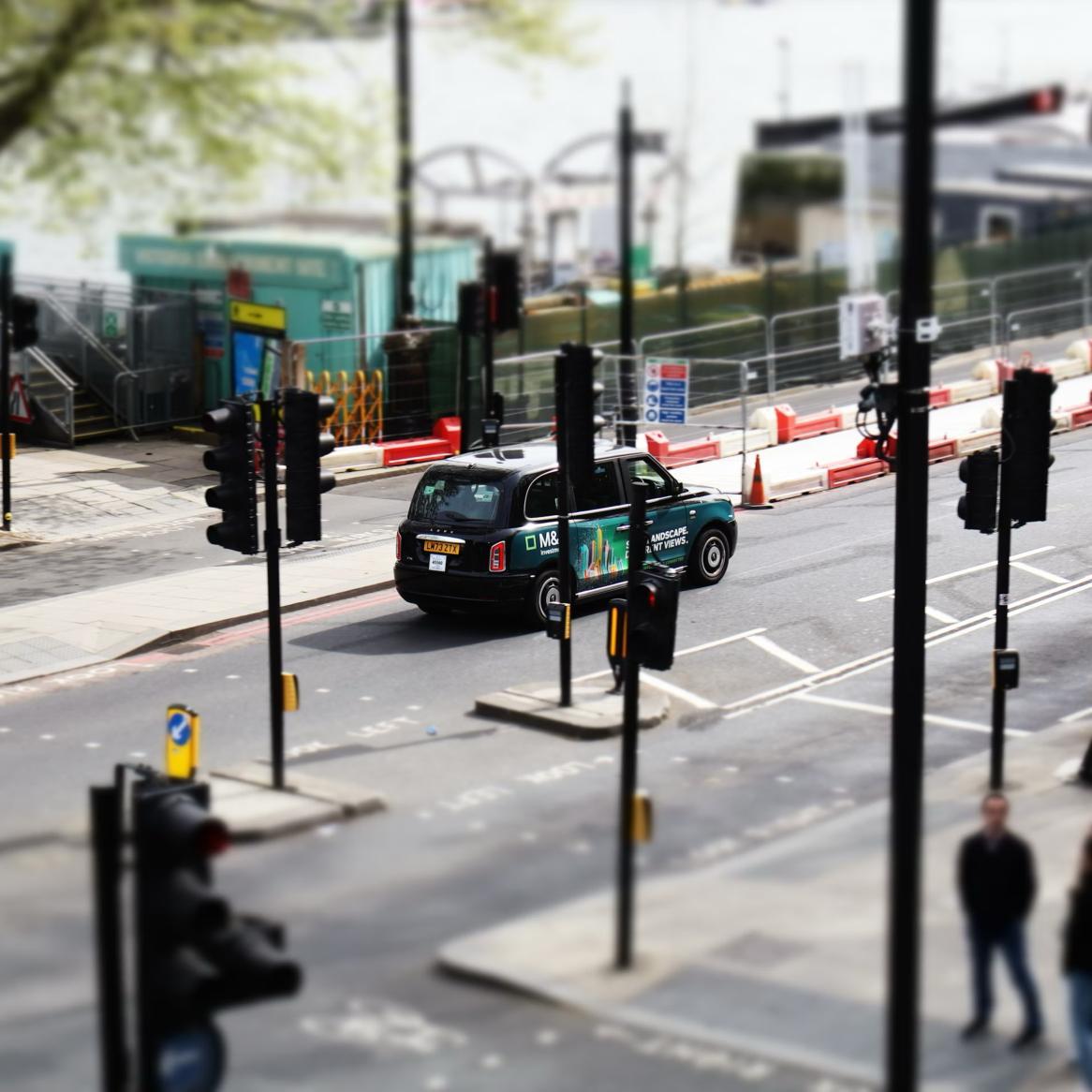




London’s licensed taxi industry has issued a damning response to the Mayor of London and Transport for London’s (TfL) newly released Taxi and Private Hire Action Plan 2025, describing it as vague, ineffective, and lacking genuine commitment.
The 57-page document outlines TfL’s vision for the future of the capital’s taxi and private hire sector, aiming to modernise services, support zeroemission targets, and improve safety. However, major stakeholders in the taxi trade argue the plan

offers little of substance to tackle the critical problems faced by cab drivers today.
Steve McNamara, General Secretary of the Licensed Taxi Drivers’ Association (LTDA), described the plan as “a missed opportunity”. He criticised the document for repeating familiar promises without providing meaningful solutions. Despite referencing the challenges drivers face, the plan, according to McNamara, fails to deliver real change.

“There are no concrete actions,” said McNamara. “It’s filled with platitudes what we see are the same hollow promises to ‘work with us’, ‘consult’, ‘encourage’ and ‘lobby’… with no concrete action to support hard working taxi drivers.”
According to McNamara, the document signals that licensed taxi drivers will have to fight alone to safeguard the future of the trade. The lack of direct support from policymakers, he said, is forcing drivers to take the lead in preserving the black cab’s role in London’s transport system.
The concern is echoed by operator FREENOW UK. Danny O’Gorman, General Manager, warned of a deepening crisis within the profession, with driver numbers falling at a rate of 1,000 a year. He criticised the plan for acknowledging the issue but offering no firm route to reverse the trend.
A recent report by Centre for London projected the possible extinction of black cabs within 20 years if current trends continue. O’Gorman urged TfL to implement targeted support, including financial backing for new drivers and a review of the Knowledge of London process to boost recruitment. “The plan recognises the problem but doesn’t provide a solution,” said O’Gorman. “We need action now not vague intentions.”
The United Cabbies Group (UCG) also issued a harsh assessment. In a message posted online, they described the action plan as a “surrender document”, accusing TfL of abandoning the sector. The group highlighted the ongoing exclusion of black cabs from key roads and the perceived move towards a single-tier licensing system as pressing concerns.
Their statement reflected a broader sense of frustration: “Not sure we survive this plan if the trade doesn’t want to fight and doesn’t want to change enough sad but that’s the reality.”
The general mood within the industry is pessimistic. While the plan outlines aspirations around sustainability and customer service, many in the trade feel it lacks the urgency and practical strategy needed to support one of London’s most recognised transport professions. Without immediate intervention, industry voices fear that the city’s black cabs face long-term decline.
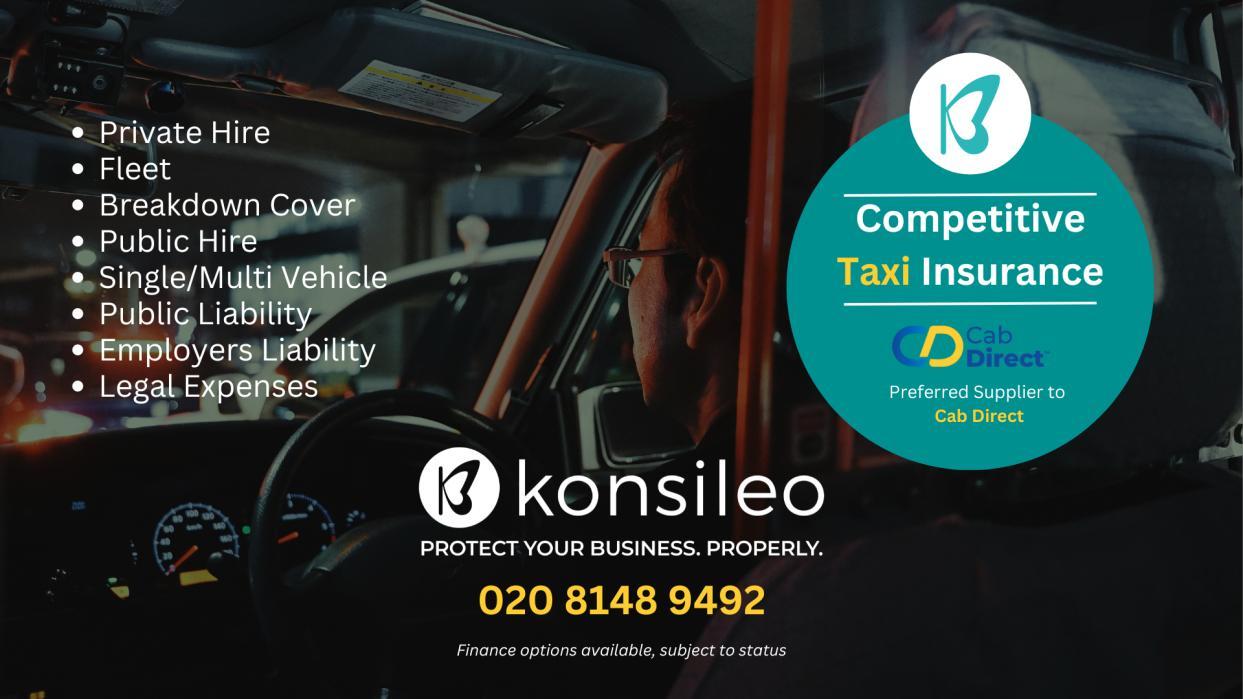



Anew report from Gett reveals that more than half of UK office workers (55%) would be willing to return to the office five days a week. However, many expect something in return.
When asked how they would respond to a mandatory increase in office days, more than half of 2,000 surveyed employees said they would seek a pay review. One in four would expect to expense food and other subsistence costs on office days.
Employers appear open to negotiations. Of the 500 business owners and senior leaders surveyed, 60% said they would consider adjusting compensation packages. Nearly half (47%) would offer more flexible working hours to help employees avoid peak travel times.
Gett, a taxi booking platform used by more than 2,000 UK businesses, commissioned the research. The company provides an easy-to-use system that consolidates taxi rides into one monthly bill, reducing the need for manual expense reports. Clients include major law firms, media organisations, financial institutions, and consultancy firms.
The research highlights a gender gap in flexible working policies. This year, 23% of male employees have been granted more flexibility in when and where they work, compared to just 14% of women. While a higher proportion of men believe their office policies are fair, they are also more likely to raise the issue with employers. If required to work in the office more, 58% of men would ask for a renegotiation, compared to 43% of women.
Despite the push for hybrid work, productivity remains a key consideration. Over half of employees believe they would be more productive in the office full-time. Three-quarters say working in the office improves collaboration,
with 77% admitting their work suffers when they do not know their colleagues well.
Business leaders share similar concerns. Most (71%) believe a fully remote workforce would negatively impact profits, and 64% are actively measuring how office attendance affects productivity. Nearly a third (27%) already have employees working in the office five days a week.
Definitions of flexible working vary. Just 31% of employees believe true flexibility means complete freedom over when and where they work.
Commuting is often seen as a downside of office work, but many employees are using travel time productively. Younger workers (18-24 and 25-34) are the most likely to work during their commute (91% and 88% respectively), compared to 51% of those aged 55 and over.
Rosie McKinnon, Gett’s Director for B2B, said: “While opinions around flexible working and ‘RTO’ continue to divide, our report reveals overall sentiment towards returning to the office is that it is better for individual and business performance.
“Our research shows that the majority of organisations will stay agile and adapt to different working policies and patterns, but the importance of being able to travel to shared workspaces to connect remains a constant. Wherever it’s done, workers and their employers will see stronger results from people engaging in ‘intentional working’ – maximising the time they spend with colleagues collaborating, problem solving, and innovating.”
Rosie adds: “As we all strive for work/life balance, this shows commitment to making all “work” time count. The organisations we partner with that empower their teams with flexibility and autonomy, choose us to help guarantee that those work journeys are smoother and quicker for their workers and create an opportunity to be more productive.”

n an exclusive Q&A session, TaxiPoint Editor Perry Richardson sat down with Layla Barke-Jones, Dispute Resolution Partner at Aaron & Partners, to delve into the high-stakes crowdfunding campaign launched by Delta Taxis and Veezu.


Their aim? To secure £500,000 to challenge Uber’s approach to VAT obligations at the Supreme Court. The session explores why some operators are acting now,

highlighting the risks of a significant shift in the industry. With potential consequences for VAT liability, business models, and employment structures, both traditional operators and drivers stand at a pivotal crossroads. The discussion also tackles the role of government intervention and what the future could hold for a sector on the brink of major change.
Why is now the time for other private hire operators to get involved?
The risk to the industry has never been greater. Traditional firms have relied upon the agency model to run their business and keep them competitive. This has already been ruled against in London and now the rest of England and Wales faces the same plight if Uber are successful at the Supreme Court. The previous government was very clear, through the consultation, that if Uber are successful in this case, this will mean


comes into the office to hand it over. This isn’t about exemption - it’s about ensuring consistent rules across the sector so traditional operators aren’t unfairly penalised. Burying your head in the sand is not an option. If an operator should have been charging VAT but didn’t, they’ll be facing a significant bill from HMRC, and the guidance is clear on this. Meanwhile the recent decision allowing Bolt to be able to use the TOMS scheme – meaning they only need to charge VAT on the difference between what the passenger pays and what the driver receives – will deepen the disparity between traditional private hire operators and ride-hail based platforms.

How could the private hire vehicle sector change for both drivers and customer should Uber win?
Uber are seeking a ruling that the only way for those using the agency model in England and Wales –those providing booking services as agents for the drivers - to survive in their current form is to win the case at the Supreme Court.
After appeals from both sides of the arguments already, is the Supreme Court the ‘last chance saloon’ for both sides?
The Supreme Court is the highest court in the land, there is nowhere else to go after this, it really is ‘last chance saloon’. If the Supreme Court do not agree with us there will be no future for the agency model in the industry unless there is a change in the law.
Drivers will become the agents of operators (not the other way around). They will be responsible for collecting fares and collecting VAT. If the fare isn’t already paid directly to the operators (as ride hail apps do), then the driver will be responsible for handing over the VAT - 20% - from every fare to the operator for them to add to the VAT return and pay to HMRC. Since operators will be taking on a risk for this and will be taking on additional cost in completing the VAT returns, they may also raise their fees to drivers to account for the additional costs and risks.
Many operators using the agency model may choose to fold. This would force drivers to seek work with other operators – and that shift could also affect their employment status. For example, drivers going

from a traditional agency model where they operate on a self-employed basis may find their operator no longer can compete if they need to add VAT and incur the costs of completing VAT returns. A result of this could mean forcing drivers to app-based providers who only offer drivers worker status, like Uber -following the Supreme Court ruling against them in 2021.
Realistically, drivers will also be hit with falling demand. Customers are the real victims if the agency model is scrapped as a result of this case. They will have to pay 20% more for journeys which were previously exempt from
business expenses. TOMS, the scheme used by some operators to charge less VAT, prevents the operator from being able to reclaim the VAT they spend on business expenses. The previous Government mooted ideas regarding zero rating private hire, giving it a low rating (at 5%) or introducing a margin scheme (VAT charged on profits) similar to TOMS. Nothing appears to have happened as a result of that consultation which closed in 2024, and the industry should not sit back and wait for zero rating, low rating or an industry specific scheme.

“TheSupreme Courtisthe highestcourt intheland, thereis nowhereelse togoafter this,itreally is ‘lastchance saloon’.”
The Government consultation appeared to dismiss or otherwise back off from zero or low rating as it would deprive the Treasury of income it currently received from those operators who charge VAT at the moment. The consultation appeared to favour a margin scheme which would presumably impact operators on recovering their VAT on business expenses. However, there has since been a change in Government and the priorities in relation to raising public finances appear to have shifted. The industry cannot afford to wait to see what the Government will do on VAT. We are very clear that if VAT is going to apply, it must do so in a way that preserves access to transport for the people who rely on it most.
There is less need for the Government to act if the choice of models which has existed for nearly 50 years under the current legislation is permitted by the Supreme Court. Therefore, our focus is on protecting the industry through the current legal battle rather than depending on the Government to take affirmative action.


The taxi and private hire industry is grappling with mounting costs, regulatory challenges, and an evolving technological landscape. A new survey conducted by TaxiPlus, in collaboration with TaxiPoint, incorporating responses from nearly 1,500 drivers across the UK, provides a comprehensive picture of the average driver and the industry’s most pressing concerns.


The respondents in this survey are overwhelming employed males, with an average age of 44 years old, and have been licensed for around 9-15 years. These drivers work roughly 45 hours per week, completing around three fares per hour and covering more than 35,000 miles annually.
Vehicle of choice varies by region, but some of the most common models include the Toyota Prius, Ford Mondeo, and Volkswagen Passat. Insurance costs around £1,500 a year, while maintenance expenses sit at approximately £2,700.
Technology plays a key role in their work, with most drivers sourcing fares from a mix of ridehailing apps and traditional bookings. However, despite the rise of digital platforms, many taxi drivers still rely on traditional street hails and operator dispatch systems.
While drivers enjoy the flexibility of selfemployment, they face daily frustrations. They regularly encounter verbal abuse, and a significant proportion of drivers experience physical violence while on the job. Road conditions also add to stress, with potholes and poorly maintained infrastructure ranking high among their concerns.


Drivers voiced a range of concerns, with cross-border licensing emerging as the most pressing issue. Many believe that current rules allow drivers licensed in one authority to operate in another without meeting local standards, creating an uneven playing field.
The transition to electric vehicles (EVs) also featured prominently, with 88.5% of drivers stating they are currently unable to charge an EV at home. Many feel that the Government’s push towards sustainability is out of step with industry realities, given the lack of charging infrastructure and high upfront costs of electric vehicles.
Rising maintenance costs, including fuel and repairs, are another significant burden. With vehicle upkeep costs soaring in recent years, some drivers are struggling to maintain profitability.
Despite these challenges, the majority of drivers still see their work as worthwhile. Many are committed to the job despite the difficulties, citing the importance of their role in keeping the country moving.
However, there is growing frustration with policymakers. Drivers feel their concerns are being ignored, particularly when it comes to safety, regulatory inconsistencies, and financial pressures.
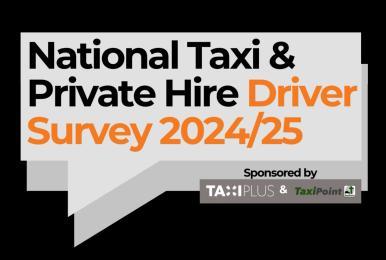
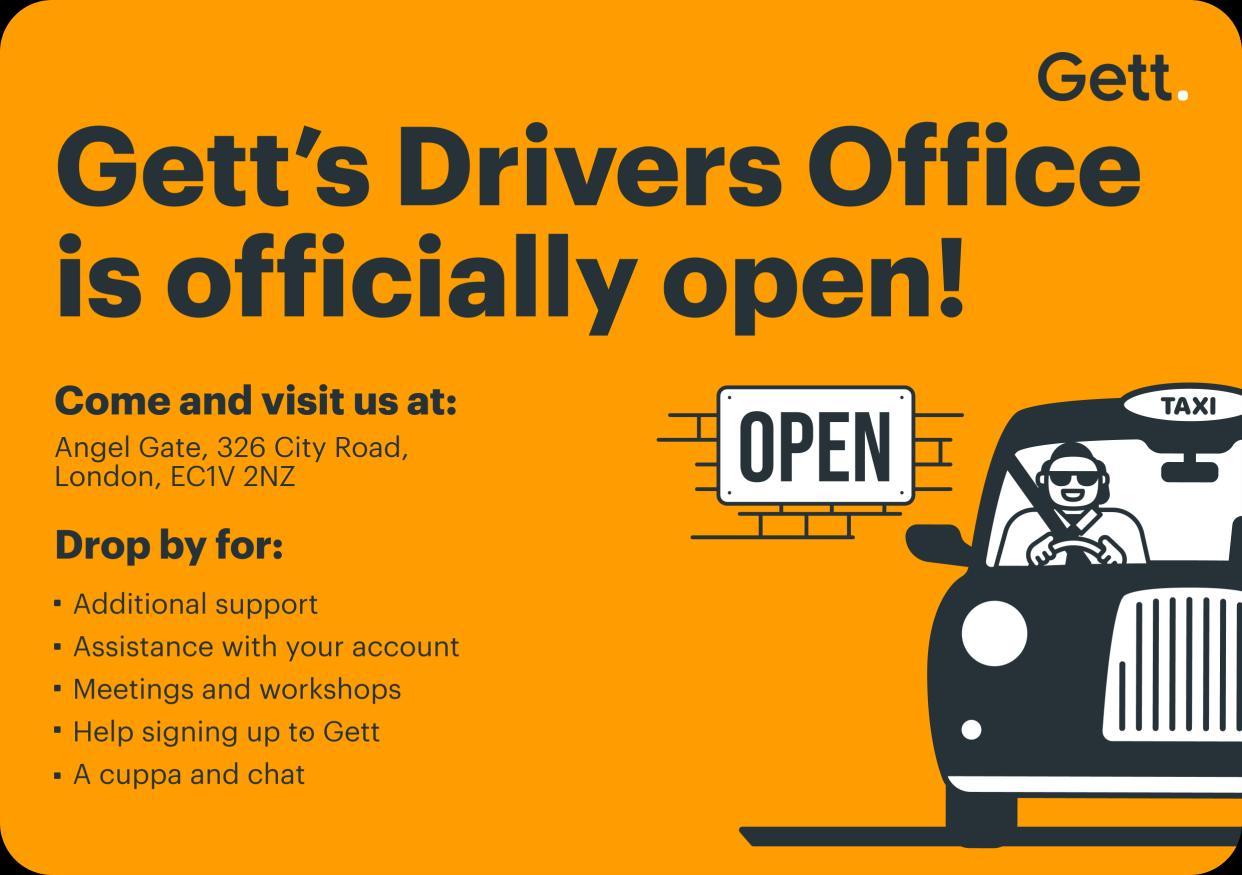


Thousands of taxi and private hire vehicle (PHV) drivers could see changes to their tax obligations under new government plans to simplify the system. The Treasury is set to raise the threshold for Self-Assessment tax returns from £1,000 to £3,000 gross within this parliament. This means self-employed workers earning below this new limit will no longer need to file a tax return, reducing paperwork and compliance burdens.
The Government estimates that around 300,000 self-employed individuals will benefit from the change, including many in the taxi and ridehailing sectors. Of these, approximately 90,000 will be removed from the reporting system entirely as they will have no tax to pay. Others who do owe tax will be able to use a more streamlined online service to settle their obligations.
The reform is part of a broader push to modernise HMRC and make tax compliance more efficient. By increasing the threshold, the Government aims to reduce red tape and free up time for self-employed workers
who often face complex financial reporting alongside their daily operations.
For taxi and PHV drivers, the real impact of this change will depend on individual earnings. Most full-time drivers are unlikely to benefit, as they typically earn well above the £3,000 threshold. The nature of the industry means that even parttime drivers often exceed this level once vehiclerelated expenses, fuel, insurance, and licensing fees are factored in. These costs quickly push gross earnings beyond the new limit, meaning the majority of drivers will still need to submit a Self-Assessment tax return.


The drivers most likely to see an advantage are those working only occasionally. For this small section of the industry, the removal of tax return obligations could reduce administrative burdens. However, this represents a minority of drivers, as most rely on their taxi or PHV earnings as a primary income source.
James Murray, the minister responsible for HMRC, also provided further details on the Government’s wider tax reform plans. His speech, marking HMRC’s 20th anniversary, outlined measures to tackle tax fraud and streamline customs procedures. These steps are part of a broader economic strategy aimed at supporting self-employed workers and businesses across the UK.
While the increase in the tax return threshold will remove some drivers from the reporting system, its overall impact on the taxi and PHV industry is expected to be minimal. The vast majority of drivers will continue to operate above the new limit, meaning they must still comply with standard tax reporting requirements. For those in the trade, tax obligations will remain largely unchanged despite the Government’s latest efforts to simplify the system.






ADepartment for Transport (DfT) minister has urged local authorities to work with police to crackdown on ‘GHOST PLATES’ used on taxi and private hire vehicles.
A parliamentary question raised by Labour MP Sarah Coombes has brought fresh attention to a growing issue affecting the taxi and private hire industry the use of so-called ‘ghost plates’.
Ghost plates are vehicle number plates altered or manufactured to evade detection by traffic enforcement cameras and Automatic Number
Plate Recognition (ANPR) systems. These plates can be tampered with using reflective films, spacing alterations or even digital technology to distort characters, making them unreadable or invisible to cameras.
The Department for Transport confirmed it is aware of ghost plates being used on taxis and private hire vehicles. In a recent response, Simon Lightwood, Parliamentary Under-Secretary for the department, said local licensing authorities are expected to work with police forces to tackle the problem.
Ghost plates pose a significant enforcement challenge. In the taxi and private hire sector, where passenger safety and accountability are paramount, the presence of untraceable vehicles undermines regulation and trust. Vehicles displaying these illegal plates can evade congestion charges, speed cameras, low-emission zone fees and insurance identification. In cases involving licensed drivers, it may also allow them to avoid penalties for breaches of licensing conditions.
Industry observers say tougher enforcement and increased collaboration between local authorities and police are needed to prevent the rise in use of these plates and protect legitimate operators. Minister Lightwood said: “We are aware of the issue of ghost plates being used on vehicles, including taxis and private hire vehicles. We would expect licensing authorities to work with the police to address this.”





Minister Lightwood said:
“On 25 February 2025, the Government announced that the PITG will be extended into the 2025/26





Transport for London (TfL) has identified more than 60 cases of illegal taxi and private hire activity at Heathrow Airport over the past year. The figures were revealed in response to a question from London Assembly Member Bassam Mahfouz, who sought an update on enforcement measures at the airport.
London Mayor Sadiq Khan confirmed that TfL is actively targeting illegal operators at Heathrow through both uniformed and covert patrols. The focus has been on Terminals 2 and 3, where officers have been working alongside police to deter and detect unauthorised drivers.
TfL’s enforcement efforts aim to safeguard passengers while ensuring a level playing field for licensed taxi and private hire drivers. The organisation continues to prioritise Heathrow as a key location for tackling illegal activity, using intelligence-led operations to address the issue.
focus on keeping passengers and visitors coming to London safe while supporting legitimate taxi and private hire trades.
“During the last year, TfL has continued to deploy its Operations Officers to Heathrow, using various operational tactics and working closely with the police to detect illegal activity. These tactics include highly visible patrols to deter illegal drivers, and non -uniform operations where TfL’s Operations Officers have a targeted approach to detecting illegal drivers touting customers as they exit airport terminals. The team has concentrated primarily on activities in and around Terminals 2 and 3.
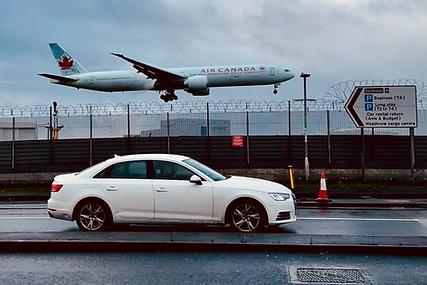
“In the past 12 months, TfL’s Operations Officers have detected over 60 cases of illegal activity at Heathrow. TfL will continue with this work to deter illegal drivers and reassure passengers.
Mayor Khan responded: “Transport for London (TfL) takes passenger safety very seriously. Heathrow is one of its priority locations, and TfL continues to
“Heathrow has delegated the powers around the Heathrow byelaw to TfL. However, TfL can't discharge these powers until the data processing agreement is concluded, which is currently in progress.”


London’s Black Cabs could vanish from the capital’s roads by 2045 unless urgent action is taken, a new report from Centre for London has warned.
The number of licensed taxis has dropped significantly over the past decade. In 2013-14, there were 22,810 Black Cabs operating in London. By 2023-24, this had fallen by over a third to 14,470.
At the same time, private hire vehicles (PHVs) have surged in numbers. Since 2010, firms such as Uber, Bolt, and Addison Lee have rapidly expanded. The number of PHV drivers licensed by Transport for London (TfL) has risen by 82% since 2009-10, reaching 107,884 in 2023-24.
Public sentiment strongly supports Black Cabs. Twothirds of Londoners believe more should be done to protect the trade. Black Cabs remain the only fully wheelchair-accessible option in the capital and can be hailed from the street or found at dedicated ranks. All drivers must pass the Knowledge of London exam, a DBS check, and regular medical assessments. Despite their decline, 78% of Londoners still expect them to be around in 100 years.
However, financial pressures are pushing the industry towards collapse. The cost of a new electric Black Cab has risen by 39% since 2017, while financial support for drivers has been cut. The TfL scrappage scheme, which provided £10,000 to remove older vehicles, ended in 2022. The Department for Transport’s Plug-in Taxi Grant has been reduced from £7,500 to £4,000 and will disappear entirely by 2026. This means government
support for buying new taxis will drop from £17,500 in 2017 to nothing.
Centre for London is calling for reforms to reverse the decline. It recommends modernising the Knowledge of London to reduce the 66% drop-out rate. A new interest-free loan scheme, similar to Scotland’s Switched On Taxis Loan programme, could help newly qualified drivers afford electric Black Cabs.

transport network, providing high quality safe, accessible journeys for millions of people every year. However, these findings show that without intervention from the Mayor of London, TfL, and central government, the iconic London black cab could soon become a thing of the past.
“Despite costs rising substantially for taxi drivers in recent years, financial support from TfL and central government has become almost non-existent.
“FREENOW strongly endorses the recommendations in this report, and we are calling on the Mayor to instruct TfL to set out a clear strategy for recruiting and retaining taxi drivers as part of its upcoming Action Plan.”

Taxi and private hire vehicle (PHV) drivers in London could soon see their licence and assessment fees rise, if proposals due to be considered on 9 April are approved by Transport for London’s (TfL) Finance Committee.
The committee will review a series of recommendations to increase several driver-related charges, including application assessments, licence renewals and English language tests. The measures follow a recent review of the cost and delivery of licensing services.
Among the key changes proposed is a rise in the private hire driver licence fee from £310 to £343. The taxi driver licence fee would also increase, from £300 to £343. In contrast, the private hire vehicle licence fee would remain frozen at £140, while a taxi vehicle licence will rise £10 from £110 to £120.
Assessment fees are also set to increase. The Knowledge of London written exam for taxi applicants would rise from £200 to £225. The topographical skills test for PHV applicants would increase from £36 to £40. The English Language Requirement (ELR) and Safety, Equality and Regulatory Understanding (SERU) assessments for both initial and resit tests would rise by £4 to £14, depending on the assessment type.




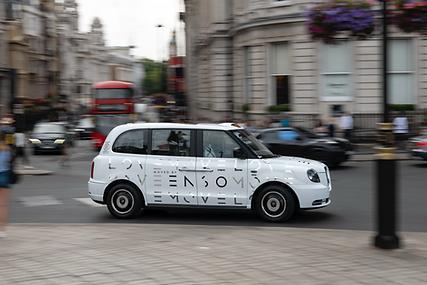
ENSO has been officially approved as a tyre supplier for LEVC, introducing its TX1B tyre as a replacement option for electrified taxi fleets and individual drivers in the UK.
The TX1B is specifically designed for the LEVC London taxi and is the first double ‘A’ -rated replacement tyre aimed at extending range. More than 1,000 London taxis have already been fitted with the TX1B, offering strong durability, safety, and performance while reducing emissions and overall running costs.
Gunnlaugur Erlendsson, Founder and CEO of ENSO, said “ENSO was created for one simple reason: to get as many low-emission tyres onto as many vehicles as possible, as quickly as possible. Our respect for the vital role that taxi drivers play in keeping our cities moving is demonstrated by the fact that we began our journey with them, helping them to improve tyre performance and save money while reducing their environmental impact. With our latest announcement that ENSO tyres are now officially LEVC-approved, we look forward to working alongside the taxi industry for thousands of miles to come.”

Queclink Wireless Solutions has launched a new 5G router designed to enhance connectivity and efficiency in the taxi industry.
The device aims to improve internet access, enable secure cashless transactions, and support real-time driver-passenger communication. It also integrates with telematics, dispatch, and ride-hailing systems to streamline operations.
The router leverages 5G’s low latency and high bandwidth to process and transmit data from multiple sources simultaneously. This allows taxi operators to monitor vehicle and driver performance with greater accuracy and immediacy. The device is powered by a highspecification Qualcomm CPU chip, typically found in premium routers, delivering advanced processing power and stability.
With Wi-Fi 6 compatibility, the router provides faster and more reliable connections than the Wi-Fi 5 technology used in most devices. It also features Bluetooth Low Energy (BLE) and RS232/RS485 serial ports, enabling seamless integration with IoT sensors, monitors, and cameras.


time, following the introduction of a new service by Glasgow Taxis.
The city’s largest taxi fleet outside London has added an option for customers to request an electric LEVC cab, known as the “EV 6”, through the Glasgow Taxis app.
The feature allows users to select the vehicle type when booking. Those preferring to book by phone can also request an electric cab, though availability is not guaranteed.
The move comes as demand for greener transport grows, driven by environmental policies, government incentives, and a shift in corporate travel preferences towards sustainability.
Glasgow Taxis’ app offers a secure and straightforward booking process, with real-time tracking for added convenience. The app is available for download on Apple’s App Store and Google Play for Android users.

all customers, which is now visible at booking stage on the Glasgow Taxis app. It has broad appeal across our customer marketplace and is a further demonstration of our commitment to meeting the evolving demands of customers in 2025.
“We have considered this option for some time and, due to the investment of the members, have now reached a stage where this can be offered as an option. Without them and that commitment the service doesn’t exist so once again we thank them for everything they do for the trade and the city.
“Despite the unprecedented challenges the Glasgow taxi trade has faced in recent years – as it has in cities across the UK – I firmly believe our fleet of taxis has never looked better and that’s all for the benefit of the people who matter most, our customers.”


IMAGE CREDIT: UBIQUITOUS

TAXI CENTRE AND DIGITAX DONATE £1,700 FOR BEATSON CANCER CHARITY DURING METER UPDATE FUNDRAISER
player in UK taxi advertising. He emphasised a focus on delivery and service, values that remain central
Portakabin in Bethnal Green in January 2005. It has been a rewarding, fun and, at times, exhausting challenge to drive the business to where it is todaya coveted position in the UK OOH sector. From day one, we have been pedantic about delivery and service quality. That hasn't changed, and I know it
I thank everyone at Ubiq (past and present) for all campaigns. You have been and will continue to be
proceeds to the charity, which provides crucial support to people affected by cancer.
Based in Glasgow, Beatson Cancer Charity funds research, education, and specialist care. It plays a key role in supporting patients and their families through difficult times.

The Taxi Centre and Digitax have donated £1,700 to recent fare increase. Rather than taking a profit, The


Uber has added Norwich to its growing list of UK cities, continuing its push to widen its operational footprint.
The launch in the East of England follows recent entries into Oxford and other regional areas as part of a broader expansion strategy. The company said thousands of users in Norwich were
already opening the app weekly, despite services not being available until now.
Uber’s Andrew Brem, said the move forms part of a long-term plan to support both riders and drivers across more towns and cities. The firm say they are offering local private hire drivers access to the platform under its standard working model, which includes holiday pay, a pension and representation through the GMB union.
In recent months, the platform has focused on developing relationships with local councils to increase coverage in areas previously dominated by traditional firms.
Reaction in Norwich has been mixed. While some passengers welcome greater choice, local taxi groups have questioned the need for additional competition, especially given concerns over vehicle numbers and availability peaking mainly at weekends.

passengers.



orthern Ireland’s Infrastructure Minister
Liz Kimmins has announced the start of a phased review into taxi policy and legislation, beginning with an assessment of Class C Taxi Licensing.
The current licensing rules follow The Taxis Act (Northern Ireland) 2008. The first phase will examine Class C taxis, which include vehicles used for weddings, funerals, chauffeur work, courtesy transport and services such as Uber.
Minister Kimmins confirmed the review in response to long-standing calls from the industry, particularly from those involved in the wedding and funeral car sectors.
She said the review will offer a chance to hear concerns and explore ways of improving how Class C licensing operates in Northern Ireland. The Minister added that while a full review of the 2008 Act is not possible during the current mandate, the phased approach will allow progress to be made on pressing issues.
The next phase of the review will look at access to wheelchair accessible vehicles, which the Minister described as a significant issue for future consideration.
Minister Kimmins said: “The taxi industry provides an important service within our community ensuring people, including the most vulnerable in society, have door to door access to work,
education, social engagements and medical appointments. I appreciate that there are a range of issues currently affecting the taxi industry in the North and I am committed to working with the industry to address these.
“I am aware that the taxi industry, in particular the wedding and funeral car sector, have been seeking a review of Class C licensing for a number of years. While a full review of the Taxi Act would not be possible within the remainder of the current mandate, I am pleased to announce a phased review commencing with a review of Class C Taxi Licensing.
“This will provide an opportunity to listen to concerns and consider options for improving the operation of Class C taxi licensing in the North. In announcing this, I recognise the importance of maintaining a professional taxi industry in the North, improving passenger safety and customer service and reducing illegal taxi activity.
“When this stage has been completed the next phase of the review of taxi policy and legislation
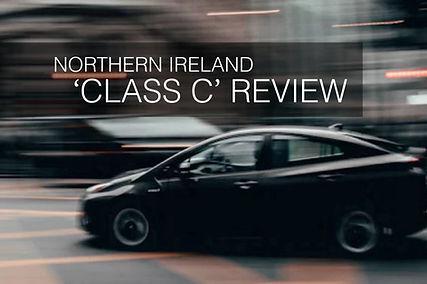


Taxi fares in the Scottish Borders are set for a 26.7% increase from April, following a review by the local council. The move, which aims to align fares with rising operational costs, comes after a consultation with taxi operators and the public.
Under the Civic Government (Scotland) Act 1982, councils must review taxi fare structures at least every 18 months. However, the latest review faced delays due to the impact of Covid-19 and an appeal process linked to the previous fare increase.
In December 2024, the council’s Executive Committee approved the proposed rise. As required by law, a public notice was published in January, allowing a month for objections. An error in the initial published tariff led to a corrected version being issued in February, extending the consultation period.
If no objections were submitted by 20 March, the new fares will take effect on 14 April. This timing is intended to coincide with school holidays, giving operators a chance to recalibrate their meters.
A new licensing policy in Derby has prompted backlash from private hire drivers, as the council moves to cut the maximum age of newly licensed vehicles from 15 to just five years.
The GMB Union, representing hundreds of drivers in the city, says the decision risks the livelihoods of many who rely on older but compliant vehicles to earn a living. Under the updated policy, any vehicle being licensed for the first time after 1 April 2025 must be under five years old. Vehicles already licensed can continue to operate up to 15 years, provided they meet existing conditions.
The changes were originally agreed in 2019 but a communication error led some drivers to believe the 15-year limit applied to all vehicles. As a result, some bought replacement vehicles older than five years, believing them to be compliant. The council has admitted the mistake and
issued an apology. A temporary grace period is in place until 31 March 2025 for those affected, allowing discretion if certain conditions are met, including proof of purchase within a specific date range.
Craig Thomson, GMB Regional Organiser, criticised the approach taken. He warned that without cooperation with drivers and the union, the council risks pushing working people out of the trade. Thomson also highlighted the contrast with neighbouring areas like Nottingham, where the limit for newly licensed vehicles stands at ten years.
Council documents show that a maximum 158 licence holders were misinformed due to the error. Only two have so far had the discretionary policy applied to their cases. The Licensing Committee is set to make a final decision on implementing the new rule from April.

drivers and passengers. The move follows several violent attacks on drivers, including the fatal stabbing of Wolverhampton taxi driver Anakh Singh in 2022.

can see drivers suspended from app-based platforms.

While continuous audio recording is not legal, switch-activated systems have been endorsed following a legal case involving Southampton Council. The new policy aligns with this ruling and follows Department for Transport guidance on in-vehicle recording.
Private hire and hackney carriage drivers were largely supportive, with 71% saying they were ‘very likely’ to install an audio-enabled system. The GMB union also welcomed the policy, arguing that it will not only enhance safety but also prevent false allegations that
There were objections. Some questioned whether CCTV and audio recording would actually prevent crime, while others raised concerns that activating a panic switch in front of an aggressor could escalate a situation. Despite this, the council believes the benefits outweigh the risks.
To avoid extra costs for drivers, the council will not impose additional charges for those who opt to install compliant systems. However, failure to submit proof of installation to Licensing Services will be treated as misconduct, triggering a licence review.
Legal safeguards are in place, including strict data protection rules. Signs must be displayed in vehicles to inform passengers that recording is possible, and data can only be accessed lawfully. The policy also takes into account the rights of disabled passengers, particularly those with visual impairments who may not see the signage.
If approved by the Regulatory Committee, Wolverhampton will join other councils in adopting a panic-switch audio recording approach, aimed at reducing crime and resolving disputes more effectively.


Trise in licensing costs following a 60% hike approved at a full council meeting on 4 March. The increase, set to take effect from the 2025/26 financial year, will see drivers paying significantly more for essential licences.
Under the new structure, the cost of a three-year Hackney Carriage, Private Hire, or Dual Driver’s Licence will rise from £315 to £472.50, an increase of £157.50. A one-year licence, issued in
Vehicle licences are also seeing substantial increases. The annual Hackney Carriage or Private Hire Vehicle Licence will rise from £205.50 to £308.50, adding over £100 to drivers’ yearly expenses.
Drivers undergoing testing will also be hit. The application fee, which includes a DBS check, knowledge test, and English language test, is increasing from £227 to £340.20, a rise of 50%.
Retests for the knowledge exam will now cost £78.75, up from
£52.50, while the English language to £113.30.
Private Hire Operators will see no change in licence fees for fleets of more than five vehicles. However, additional administrative costs, including the replacement of lost or damaged plates and badges, are increasing by as much as 52%.
A lost driver’s badge, for example, will now cost £17.50 to replace, up from £11.55.
The scale of these increases has prompted backlash from drivers and councillors alike. Independent

councillor Sean MacLeod described the rise as “staggering” and warned that some drivers were already planning to leave the trade.
“It’s staggering, considering that taxis have already been asked to install CCTV and meet numerous other financial demands,” MacLeod said according to The Argus. “We’re hitting them with
higher fees, yet they are seeing no benefits in return. Licensing costs keep going up, but meter rates have only increased once in that time.”
MacLeod also highlighted a breakdown in communication between taxi drivers and the council, with drivers no longer able to speak directly to licensing
officers via a dedicated phone line.
With Lewes District’s Hackney Carriage fleet dwindling to just 89 drivers, concerns are growing that rising costs could further damage the industry. Despite this, the council insists the new fees are necessary to cover administrative expenses and ensure public safety.
A Salford-licensed private hire driver has been fined after admitting to illegally picking up passengers without a booking.
Mr Arif Mohammad pleaded guilty at Manchester and Salford Magistrates’ Court following an investigation by Salford City Council’s Licensing Service. The case stemmed from a complaint made by a passenger who reported being overcharged after a concert at Bolton Stadium.
The passenger approached Mr Mohammad’s private hire vehicle and requested a journey to a hotel for herself and three others. Mr Mohammad agreed to take them without a booking through a licensed private hire operator. This is a breach of private hire regulations, which
require all journeys to be prebooked to ensure insurance validity.
During an interview, Mr Mohammad admitted his actions, calling them a “big mistake” and expressing regret.
Salford City Council takes breaches of taxi and private hire regulations seriously, particularly offences involving illegal pick-ups. Such violations can lead to a driver’s licence being suspended, revoked or refused upon renewal.
Mr Mohammad was fined £400, ordered to pay £1,200 in costs and given a £160 victim surcharge. The offence was prosecuted under the Town and Police Clauses Act 1847.
Councillor Barbara Bentham, Salford City Council's Lead Member for Neighbourhoods, Environment and Community Safety, said: “Taxi and private hire services are an important part of the transport network, and we thank all of our licensees that operate to a safe and high standard. Drivers have a duty to operate in accordance with the law and the conditions of their licence and the authority will not hesitate to take enforcement action where necessary.“



A joint operation between the City of Wolverhampton s Compliance team and Greater Manchester Police Traffic resulted in multiple vehicle checks, uncovering safety concerns.
A Liverpool taxi has been suspended from service after licensing officers found it operating with a seriously dangerous worn front tyre.
Liverpool City Council’s Licensing team made the discovery during a routine check, highlighting serious safety concerns.
Images shared by the council show extensive wear on the inside of the tyre, with exposed inner cords visible on a large section of the tyre.
The incident on Wednesday 5 March serves as a firm reminder for taxi drivers to conduct regular vehicle checks.
A Liverpool City Council Licensing spokesperson said: “Liverpool Licensing Officers discovered this LCC Taxi operating this afternoon with one of its front tyres in this condition - there is no excuse for it- It only takes a few minutes to check your tyres!”

During the enforcement effort in Manchester, officers inspected 16 private hire vehicles licensed by the City of Wolverhampton Council. Two were found with defective rear number plate lights.
More concerningly, one driver was caught watching a video on his phone while driving.
maintain safety standards on the road.
A City of Wolverhampton Council Public Protection spokesperson said at the time: “On Saturday night, Compliance worked with Greater Manchester Police Traffic in Manchester. 16 City of Wolverhampton Council vehicles checked, 2 had defective rear number

Police have taken action, with the driver set to be reported for summons. The private hire licence will also be reviewed.
The operation highlights the ongoing scrutiny of private hire vehicles and drivers to
plate lights. 1 driver was caught watching a video on his phone while driving!
“Police to report for summons and private hire driver (PHD) licence to be reviewed.”

Warwick District Council, in partnership with the Driver and Vehicle Standards Agency (DVSA) and Warwickshire Police, has carried out inspections on private hire vehicles across the district.
A total of 48 licensed vehicles were checked to ensure they met legal and safety standards. Special attention was given to vehicles approved for wheelchair access, with drivers assessed on their ability to assist passengers. Local healthcare company Wenmans, based in Barford, provided a wheelchair free of charge for the operation.
Several vehicles were found to have serious faults and were immediately taken off the road. These included a vehicle with tyre tread below the legal limit and a defective brake light, another with cords exposed on two tyres, and a third with defective brakes. All drivers were issued with traffic offence notices.
A driver was also breathalysed after alcohol was found in the rear of their vehicle. The test result was zero.
Three further vehicles were given delayed prohibition notices, requiring defects to be fixed within 10 days before another MOT. Licensing officers will also follow up on 10 minor infringements found in other vehicles.
Some vehicle owners will now face conduct points and potential referral to a Licensing and Regulatory
Panel. The checks form part of the council’s ongoing work to ensure safe and compliant taxi services in the district.
Councillor Jim Sinnott, Portfolio Holder for Safer, Healthier and Active Communities, said: “I would like to express my thanks to the Council’s Licensing team, the DVSA and Warwickshire Police for carrying out this essential activity. Taxi drivers play an important role in providing transport to those that need it, so it’s vital that they keep their vehicles safe and legal, protecting both their passengers and the wider community.
"We'd like to thank all 48 private hire vehicles drivers for coming to their inspection, to ensure high safety standards.
“The Council takes its licensing responsibilities seriously and will not hesitate to take action to guarantee the public’s safety.”


Taxi enforcement officers from Ribble Valley Borough Council, working with the Driver and Vehicle Standards Agency (DVSA), have carried out safety checks on taxis and private hire vehicles working in the area.
A total of 11 private hire and hackney carriages were inspected, nine of which were licensed by Ribble Valley Borough Council. Most were found to be in compliance, but three vehicles had faults requiring immediate action.
A private hire driver has been caught continuing to work despite having their licence revoked by the local authority.
West Yorkshire Police’s Steerside Enforcement Team stopped the vehicle on Owlet Road in Shipley. Checks confirmed that the driver no longer held a valid private hire licence. The vehicle was seized at the roadside due to insufficient insurance cover. The driver has been reported to court and also to Bradford Council for further action.
One Ribble Valley-licensed hackney carriage was found with two tyres below the legal tread limit. A private hire vehicle licensed in Blackburn with Darwen had an insecure passenger seat. Both vehicles were taken off the road but returned to service after repairs.
Another Ribble Valley-licensed private hire vehicle had a faulty indicator, which was fixed immediately, and an ABS fault that was repaired within six days.
Councillor Ian Brown, chairman of the council’s licensing committee, said: “The safety of passengers in the borough’s taxis is the priority.
“The majority of taxi operators make sure their vehicles are properly looked after and safe to be on our roads. These regular checks help make sure that those standards are maintained, and highlight those vehicles that don’t meet the grade and take them off the road if necessary.”

Operating a private hire vehicle without the correct licensing and insurance can result in

prosecution, fines, and disqualification from future licensing.
West Yorkshire Police Steerside Enforcement Team said: “We stopped this Private Hire vehicle on Owlet Road, Shipley. The driver was found to have had their private hire licence revoked but was continuing to operate.
“Vehicle seized for insufficient insurance cover and driver reported to court & Bradford Council.“



















